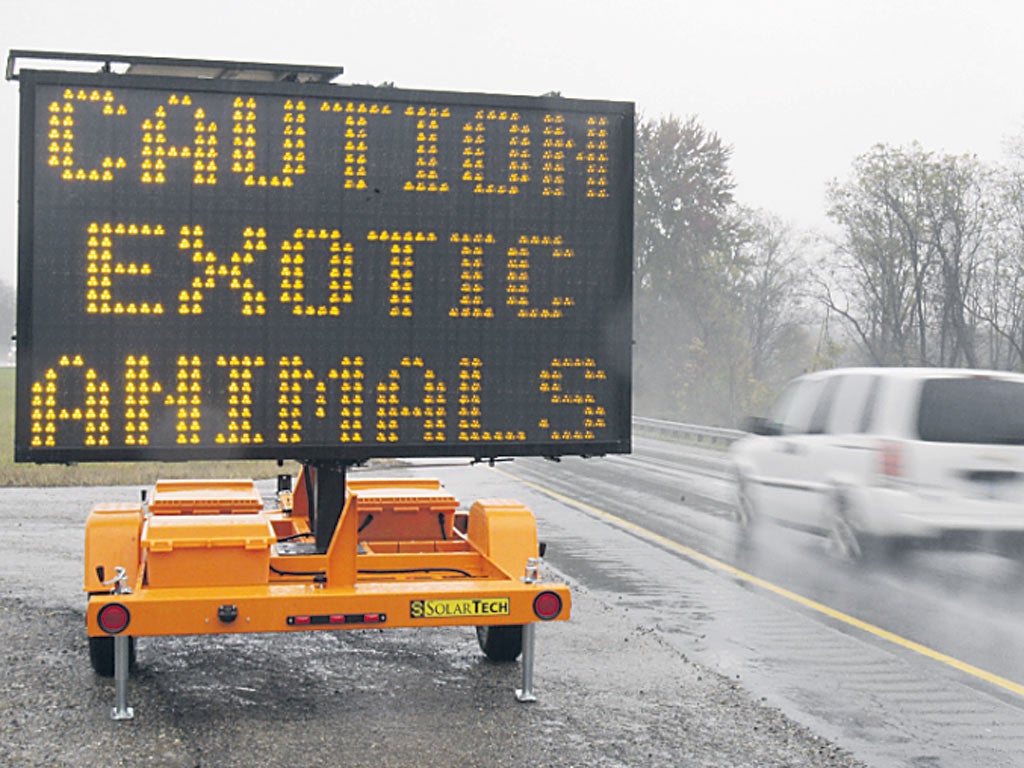Zoo slaughter puts lax ownership laws in activists' sights
The deaths of nearly 50 wild animals, freed by their owner who then killed himself, spotlights flaws in US legislation

It wasn't easy for residents of Zanesville, Ohio, to fathom how such carnage involving so many exotic animals could have happened in their midst yesterday, and yet, looking back, you could say that something like this was always bound to happen at Terry Thompson's private compound.
The pandemonium at the Muskingum County Animal Farm began late on Tuesday when police officers responded to calls that some of its 56 animals were on the loose. They found the farm gate unlocked and animal cage doors wide open. They also found Thompson dead from a gunshot wound. It is believed he shot himself.
That Thompson, a veteran of Vietnam who sold firearms from the farm and once owned a Harley-Davidson dealership in the area, had long been at war with the rest of the world was no secret. He had just spent a year in prison for firearms violations and had often been in dispute with neighbours.
The sheriff's office had received numerous complaints since 2004 about animals escaping on to neighbours' property. Thompson had been charged over the years with animal cruelty, animal neglect and allowing animals to roam.
Some who had had run-ins with Thompson, who lived on the 70-acre farm – which was not open to the public – with his wife, Marian, think they know what happened.
Desperate for whatever reason – perhaps the huge cost of keeping the animals had overwhelmed him – he freed them as a parting gift to all his neighbours. It "could have been a 'f*** you' to everybody around him," suggested Angie McElfresh, who lives close by.
"What a tragedy," Barb Wolfe, a veterinarian with The Wilds, a nearby zoo-sponsored wild animal preserve. "We knew there were so many dangerous animals at this place that eventually something bad would happen, but I don't think anybody really knew it would be this bad."
It could have been worse. When Sheriff Mark Lutz arrived at the farm with his deputies they were confronted by wild and dangerous animals everywhere. His first concern was the safety of his officers and the local community. Containing the animals, which mostly meant shooting to kill, was his first priority before someone got mauled.
After an all-night hunt that extended into Wednesday afternoon, 48 animals were killed. Six others – three leopards, a grizzly bear and two monkeys – were captured and taken to the Columbus Zoo. A wolf was later found dead.
Another monkey, that was carrying the dangerous Herpes B virus, is believed to be dead after being eaten by one of the other animals.
Those destroyed included 18 rare Bengal tigers – an endangered species – and 17 lions, six black bears, two grizzlies, a wolf, a baboon and three mountain lions. Dead animals were being buried on Thompson's farm, officials said.
The state of Ohio was under scrutiny last night. With few federal laws in place to control private ownership of exotic species, the burden is on individual states to put regulations in place. But Ohio, it turns out, was more lax than any other. Even a law that prohibited the sale of wild animals was allowed to expire in April this year.
"There is an epidemic of private ownership of dangerous exotic animals in the United States," noted Wayne Pacelle, head of the Humane Society of the United States.
He said that there were "thousands of exotic animal menageries across the nation".
Subscribe to Independent Premium to bookmark this article
Want to bookmark your favourite articles and stories to read or reference later? Start your Independent Premium subscription today.

Join our commenting forum
Join thought-provoking conversations, follow other Independent readers and see their replies